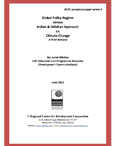 Global Policy Change Vs Odishan Approach on Climate Change
Global Policy Change Vs Odishan Approach on Climate Change
Publication Date : 07-Feb-2013
India ratified the United Nations Framework Convention on Climate Change (UNFCCC) in 1993, and the Kyoto Protocol in 2002.
Under the Convention, India (and other developing countries), has not had to undertake legally binding commitments to reduce its greenhouse gas (GHG) emissions, since the major proportion
of the problem (and historical responsibility) was due to emissions from developed countries. As a result, the Kyoto Protocol the burden of emissions reductions is not placed on India (and other
developing countries) ‐ they are exempt from mandatory emissions reductions.
|
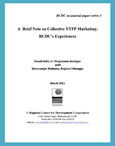 A Brief Note on Collective NTFP Marketing: RCDC's Experience
A Brief Note on Collective NTFP Marketing: RCDC's Experience
Publication Date : 07-Feb-2013
Collective marketing of NTFPs has been a common strategy to help secure the rights of & benefits for the primary collectors, particularly for women. As well-known the traders and even
the intermediaries are men whereas the primary collectors are usually women. Traders thrive on the ignorance & innocence of these primary collectors, and collective effort gives the latter a
better scope to deal with the hard realities of market dynamics. It gives a better bargaining power, helps control the process from collection to value addition followed by marketing so as to
facilitate sustainable extraction practices, relaxes the burden of loss by sharing among the members, creates better scope for availing support for capacity building (technical/financial), and
ultimately makes them able to go beyond trading and support something for the cause of the society(like, facilitating the implementation of Forest Rights Act, providing employment to
physically-challenged or otherwise vulnerable individuals, etc.). When cooperatives extend their services for the greater benefit of the society, they become what may be called Socially
Embracing Cooperatives.
|
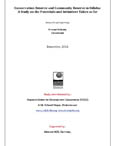 Conservation Reserve and Community Reserve in Odisha
Conservation Reserve and Community Reserve in Odisha
Publication Date : 07-Feb-2013
This report titled Conservation Reserve and Community Reserve in Odisha: A Study on the Potentials and Initiatives Taken so far is an outcome a series of case studies, with collection of information through RTI, other sources like web-portal & literatures, discussion with forest officials, and its detailed analysis.
|
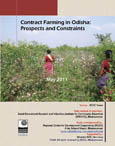 Contract Farming in Odisha: Prospects and Constraints
Contract Farming in Odisha: Prospects and Constraints
Publication Date : 07-Feb-2013
Contract farming is one of the illustrated examples of the impact of globalization and liberalized economic policy in the agriculture sector. While the farm sector is facing an identity crisis amidst
growing dominance of the industrial sector, contract farming helped to create a new hope in this scenario. It established a link between the farm sector and the corporate sector too. This way it
created new prospects for the agricultural sector, and added to the dignity of the farmer. However, the actual practice was often not so farmer-friendly. Rather it was an arrangement to best exploit the
farmers’ lands in the interest of the contracting agency. Innocence and ignorance of the farmers,absence of a strong farmer-security mechanism, and tactfully drafted legal papers favoured the other
side very much. And the result was quite obvious; farmers suffering in many ways, long-term socioeconomic and environmental threats perceived, and marginality of farmers getting increased.
|
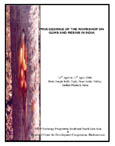 Procedures of Workshop on Gums & Resins in India
Procedures of Workshop on Gums & Resins in India
Publication Date : 07-Feb-2013
Gums and resins, commonly used in every day life, are having ample importance as non timber forest produce. Apart from use in torches, embalming chemicals, waterproofing and caulking ships, incense, paints and medicines, a major portion of the gums and resins are also used as food additives. So food industries worldwide are emerging as potential users of gums and resins. Gums and resins are having a niche market globally. A recent statistics says
export of gums and resins from India were to the tune of Rs. 5 billion per annum. Inspite of a shift in the global market from natural products to synthetic one, the former has its own place
and share in the market. The reason is the growing consciousness for organic/ natural foods. Still a lot to be done for accelerating the production and trade situation both qualitatively and
quantitatively. Opportunities to be explored after having a first hand knowledge on the world trade scenario of the produce. Many organizations are working in this line to know the
situation. NTFP Exchange Programme in South and South East Asia, a joint initiative of local and regional NGO’s and indigenous organizations in the region is doing a study on the world
market of resins and gums. The objective of the study is to assess the overall trade policies and instruments, market situation, production, consumption, value chain, technologies etc.
The expected outcome of the study would help in developing strategies for the future.
|
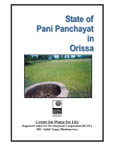 State of Pani Panchayat in Odisha
State of Pani Panchayat in Odisha
Publication Date : 07-Feb-2013
The Orissa Government, with a view to providing equitable, timely and assured irrigation has introduced the concept of Pani Panchayat for PIM. The concepts would finally lead to transfer of tertiary irrigation networks (minor/sub-minors)to registered Pani Panchayats. The responsibility of operation and maintenance (O&M) of the reservoir/ diversion weir (as the case may be) dam, spillways,
sluices, primary and secondary distribution networks etc. rest with the department of water resources, whereas the responsibility of O&M of the tertiary systems i.e. below minor and sub-minor would remain with the Pani Panchayat. The geographical extent of the programme covers the entire state comprising of about 16 lakh hectares of major, medium and minor irrigation command areas in
all 30 districts of Orissa.
|
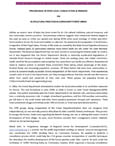 Proceedings of State Level Consultation & Training on Silvicultural Practices
Proceedings of State Level Consultation & Training on Silvicultural Practices
Publication Date : 07-Feb-2013
Bikash Rath, Sr. Programme Manager of Regional Centre for Development Cooperation(RCDC,www.rcdcindia.org ), a premier not for profit organization working on natural resource management,
also coordinates the IUFRO Working Party on Community Forestry. He wanted to facilitate a consultation process which could help the CFM groups consider incorporation of scientific techniques
like silviculture for healthy development of the forest patches under their control. As such, under the facilitation of IUFRO Working Party on Community Forestry, RCDC organized a two-day consultationcum-training1 programme on silviculture in community forestry.
|
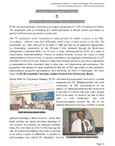 Proceedings of the Regional Consultation on Biodiversity Conservation & Bioresource Governance
Proceedings of the Regional Consultation on Biodiversity Conservation & Bioresource Governance
Publication Date : 07-Feb-2013
The 73rd amendment in the Constitution of India provides for transfer of power to the PRIs.Accordingly, different states have differently vested a part of these powers to the GPs. The
Biodiversity Act, 2002 followed by its Rules of 2004 provides for an additional responsibility,i.e. biodiversity conservation by the PRIs(and ULBs) primarily through the Biodiversity Management Committees(BMCs) at GP level. A study commissioned by RCDC in 4 states of India(Odisha, Jharkhand,Madhya Pradesh & Andhra Pradesh) revealed the status of actual implementation of this provision. A regional consultation was organized at Bhubaneswar on 28th
December 2010 in Hotel New Marrion to share these findings and also to provide an opportunity to representatives from concerned states to share their own observations and experiences. This
programme was attended by large number(more than 90) of PRI representatives and community representatives alongwith representatives from PRERAK, an NGO of Chhatisgarh.
|
 Proceedings of State Level Consultation on Biodiversity Conservation & Bioresource Governance
Proceedings of State Level Consultation on Biodiversity Conservation & Bioresource Governance
Publication Date : 07-Feb-2013
RCDC, which is pursuing a bioresource governance programme in some parts of the KBK districts of Odisha, organized a state- level consultation on 29th December 2010 at Hotel New
Marrion to discuss these issues with an objective to develop bioresources without threatening the biodiversity. More than 100 participants from various parts of the state attended this
consultation.
|
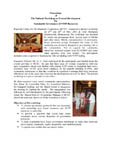 Proceedings of State Level Consultation on New Approaches in Bioresource Governance
Proceedings of State Level Consultation on New Approaches in Bioresource Governance
Publication Date : 07-Feb-2013
A one day workshop was organised on ‘New approaches in bio‐resource governance – Climate resilient agriculture in tribal areas’ on 12th Dec 2011 at CYSD – DRTC, Bhubaneswar by Regional Centre for Development Cooperation (RCDC) in technical collaboration with
OUAT (Orissa University for Agriculture and Technology) and CTCRI(Central Tuber Crops Research Institute), Bhubaneswar.
|
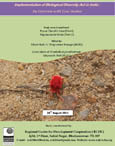 Implementation of Biological Diversity Act in India
Implementation of Biological Diversity Act in India
Publication Date : 07-Feb-2013
The study on the actual implementation of the Biological Diversity Act was commissioned by RCDC in 2010. As the report submitted by the 1st consultant did not focus on state-level field verifications, a second phase of the study was then assigned to another consultant so as to analyse & document the actual status in four different states. Hence, the present compilation has two parts: one reflecting the
overall policy scenario and the other reflecting on the actual status in the field-level implementation. However, the study could not contain extensive field information owing to a number of limitations including constraints of time.
|
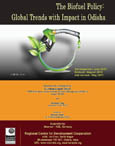 The Biofuel Policy: Global Trend With Impact in Odisha
The Biofuel Policy: Global Trend With Impact in Odisha
Publication Date : 07-Feb-2013
The biofuel perspective projects a responsibility and preparedness to face the depleting resources of mineral fuels. Biofuel policy papers are among the few policy statements that are primarily scientific with little or no political element in them, and rather represent a political responsibility with a scientific
approach. However, in reality(and unfortunately) they have rather become effective mediums of a political economy that allows vested interest groups to humbly dominate the scene and flourish their business. In brief, the cause of earth & its people turns into the cause of some seed-suppliers and related business groups.
|
 The Industrial Perspective of NTFP in India
The Industrial Perspective of NTFP in India
Publication Date : 07-Feb-2013
Indian industries have been sourcing their raw materials from the rich & diverse non-timber
forest product resources of the country since long. As detailed below they use either one or
more of these products and are in some cases almost exclusively or critically dependent on
the same:
• Paper industry: Bamboo(critical), sabai grass
• Bidi industry: Tendu leaf(critical)
• Lac processing industries: Lac(critical)
• Leather industry: Chebulic myrobalan and some other natural tan-stuff from forest
• Pharmaceuticals: Wide range of NTFPs used(critical in some cases, like Boswellia
serrata cream produced by CIPLA)
• Cosmetics: Wide range of NTFPs used(critical in some cases)
• Agarbatti industry: bamboo stick, glutinous bark, sal resin, guggul, etc.(critical)
• Vanaspati industry: mahua oil, sal seed oil, etc.
• Bio-fuel industry: karanj seed, etc.
|